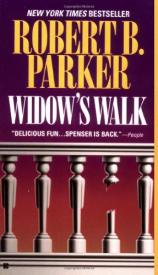Widow's Walk
Review
Widow's Walk
One of the factors which have made Robert B. Parker's Spenser
novels a continuing delight is Parker's ability, and willingness,
to stretch the boundaries of the characters and stories over time
while keeping the general spirit and feel of the books anchored
firmly in familiar ground. The result is a series that continues to
grow, but stays comfortably familiar. This has been a trademark of
the series from it's inception --- has it really been over a
quarter-century since THE GODWULF MANUSCRIPT was published?--- and
has functioned as the mechanism which has kept veteran fans aboard
while assisting new ones onto the train.
WIDOW'S WALK finds Parker stretching a bit. Most of the Spenser
novels are fairly uncomplicated affairs, with Spenser moving
doggedly if not unerringly from Point A to Point B. WIDOW'S WALK,
however, is a work of Christie-like complications. Nathan Smith,
the owner of a very successful Boston bank, is found dead, in bed,
from a gunshot wound in the head (and no, I am not channeling Dr.
Suess!). The immediate, and only, suspect is his wife, Mary, who
claims that she was watching television when her died and that she
never even heard the gunshot. Mary is such a good suspect that her
own attorney believes her to be guilty. The prosecution even has a
witness who claims that Mary attempted to hire him to kill her
husband. Spenser is nonetheless retained to prove Mary's innocence,
if possible. This is a difficult task for several reasons, not the
least of which is Mary, who is both more and less intelligent than
anyone is able to imagine. Spenser, with some assistance from the
always-welcome Hawk, does what he does best, bothering people and
kicking things over until he finds out something, but this is one
case where the process, at least initially, does not work well for
him. And it does not work well for others, either; dead bodies
start to pile up around Spenser, bodies of people with whom he
spoke regarding the case. Spenser soon finds that the more he finds
out, the less he knows. Still, he presses on doggedly, even when
frustrated; one of the best parts of the book is when he runs down,
in good-natured frustration, all of the facts which he has
accumulated and acknowledges how little he knows as a result. He
knows, for example, that Mary is lying to him, and that there is
more to her husband's life and business than is readily apparent.
None of these facts, however, bring Spenser any closer to the
truth, whatever that may be.
Regular Spenser readers may be somewhat surprised at the complexity
of the core story but Parker ultimately handles it quite adroitly,
without submerging Spenser and his always excellent supporting cast
in the details. The dialogue in WIDOW'S WALK, particularly
Spenser's, remains sparkling; those who accuse Parker of being able
to write Spenser novels in his sleep, besides being wrong, miss the
point, which is that he is able to do it so well under any
circumstances. The result of Parker's efforts in WIDOW'S WALK is to
extend, and expand the legacy of both Parker and Spenser, and to
set the standard for the next book in the series. Highly
recommended.
Reviewed by Joe Hartlaub on January 24, 2011





